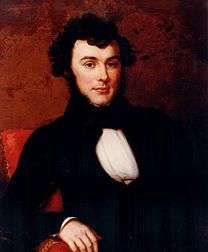George Washington Adams

George Washington Adams (April 12, 1801 – April 30, 1829) was the eldest son of John Quincy Adams, the sixth President of the United States. He had a troubled life and died of apparent suicide at age 28.[1]
Biography
Born in Berlin, the capital of the Kingdom of Prussia, George Washington Adams was the eldest son of John Quincy Adams, the sixth president of the United States, who was then serving as a diplomatic representative of the United States, and his English-born wife Louisa Catherine Adams.[2] [3] He was named for George Washington, the first president. His grandfather John Adams was the first Vice President of the United States and also the second President. He was born a month after his grandfather left office.
Adams graduated from Harvard University in the Class of 1821 and studied law. After briefly practicing law, he ran for state office. He was elected to the House of Representatives of the Commonwealth of Massachusetts in 1826 and served one year. In 1828, Adams served on the Boston City Council.[4] He wrote a pamphlet "An Oration delivered at Quincy, on the Fifth of July, 1824."[5]
He disappeared on April 30, 1829 while on board the steamship Benjamin Franklin in Long Island Sound during passage from Boston to Washington, D.C. He was last seen at about 2 A.M., and his hat and cloak were found on deck, leading to the conclusion that he had intentionally jumped.[6] His body washed ashore on June 10.[7][8] Adams had left notes hinting that he intended to kill himself,[9] and earlier on the ship he had seemed delusional, asking the captain to return to shore, and declaring that the other passengers were conspiring against him.[10] The consensus in news accounts of the time and among historians subsequently is that he committed suicide by drowning after he jumped from the Benjamin Franklin.[11][12]
Health
Adams had a troubled life. Although he never married, he had a reputation as an alcoholic and womanizer. He was said to be predisposed to gloom and paranoia, a combination that would probably be classified as depressive illness.
Family
Prior to his death, Adams had a mistress, Eliza Dolph, who allegedly gave birth to a child in December 1828.
Dolph was the chamber maid to a Dr. Welch, the family's Boston doctor. She had a child in December 1828 and was moved to another location so George could visit her and the baby in secrecy. Miss Eliza Dolph became ill in March and her child was forced to be cared for by another. She remained very ill. By July 1829, "Eliza has now gained her health- lost her child- learned a lesson by experience- by my attention, been well supported through it..." according to Miles Farmer.[13] Pages from John Quincy Adams' journal reference a letter from Dr. Storer in 1829 making him aware of certain events in George's life. Conversations held with his son Charles regarding the estate of his late son George, are also noted in his journal on June 19, 1829.
Family tree
| Adams family tree | ||||||||||||||||||||||||||||||||||||||||||||||||||||||||||||||||||||||||||||||||||||||||||||||||||||||||||||||||||||||||||||||||||||||||||||||||||||||||||||||||||||||||||||||||||||||||||||||||||||||||||||||||||||||||||||||||||||||||||||||||||||||||||||||||||||||||||||||||||||||||||||||||||||||||||||||||||||||||||||||||||||||||||||||||||||||||||||||||||||||||||||||||||||||||||||||||||||||||||||||||||||||||||||||||||||||||||||||||||||||||||||||||||||||||||||||||||||||||||||||||||||||||||||||||||||||||||||||||||||||||||||||||||||||||||||||||||||||||||||
|---|---|---|---|---|---|---|---|---|---|---|---|---|---|---|---|---|---|---|---|---|---|---|---|---|---|---|---|---|---|---|---|---|---|---|---|---|---|---|---|---|---|---|---|---|---|---|---|---|---|---|---|---|---|---|---|---|---|---|---|---|---|---|---|---|---|---|---|---|---|---|---|---|---|---|---|---|---|---|---|---|---|---|---|---|---|---|---|---|---|---|---|---|---|---|---|---|---|---|---|---|---|---|---|---|---|---|---|---|---|---|---|---|---|---|---|---|---|---|---|---|---|---|---|---|---|---|---|---|---|---|---|---|---|---|---|---|---|---|---|---|---|---|---|---|---|---|---|---|---|---|---|---|---|---|---|---|---|---|---|---|---|---|---|---|---|---|---|---|---|---|---|---|---|---|---|---|---|---|---|---|---|---|---|---|---|---|---|---|---|---|---|---|---|---|---|---|---|---|---|---|---|---|---|---|---|---|---|---|---|---|---|---|---|---|---|---|---|---|---|---|---|---|---|---|---|---|---|---|---|---|---|---|---|---|---|---|---|---|---|---|---|---|---|---|---|---|---|---|---|---|---|---|---|---|---|---|---|---|---|---|---|---|---|---|---|---|---|---|---|---|---|---|---|---|---|---|---|---|---|---|---|---|---|---|---|---|---|---|---|---|---|---|---|---|---|---|---|---|---|---|---|---|---|---|---|---|---|---|---|---|---|---|---|---|---|---|---|---|---|---|---|---|---|---|---|---|---|---|---|---|---|---|---|---|---|---|---|---|---|---|---|---|---|---|---|---|---|---|---|---|---|---|---|---|---|---|---|---|---|---|---|---|---|---|---|---|---|---|---|---|---|---|---|---|---|---|---|---|---|---|---|---|---|---|---|---|---|---|---|---|---|---|---|---|---|---|---|---|---|---|---|---|---|---|---|---|---|---|---|---|---|---|---|---|---|---|---|---|---|---|---|---|---|---|---|---|---|---|---|---|---|---|---|---|---|---|---|---|---|---|---|---|---|---|---|---|---|---|---|---|---|---|---|---|---|---|---|---|---|---|---|---|---|---|---|---|---|---|---|---|---|---|---|---|---|---|---|---|---|---|---|---|---|---|---|---|---|---|---|---|---|---|---|---|---|---|---|---|---|---|---|---|---|---|---|---|---|---|---|---|---|---|---|---|---|---|---|---|---|---|---|---|---|---|---|---|---|---|---|---|---|---|---|---|---|---|---|---|---|---|---|---|---|---|---|---|---|---|---|---|---|---|---|---|---|---|
| ||||||||||||||||||||||||||||||||||||||||||||||||||||||||||||||||||||||||||||||||||||||||||||||||||||||||||||||||||||||||||||||||||||||||||||||||||||||||||||||||||||||||||||||||||||||||||||||||||||||||||||||||||||||||||||||||||||||||||||||||||||||||||||||||||||||||||||||||||||||||||||||||||||||||||||||||||||||||||||||||||||||||||||||||||||||||||||||||||||||||||||||||||||||||||||||||||||||||||||||||||||||||||||||||||||||||||||||||||||||||||||||||||||||||||||||||||||||||||||||||||||||||||||||||||||||||||||||||||||||||||||||||||||||||||||||||||||||||||||
| Notes:
| ||||||||||||||||||||||||||||||||||||||||||||||||||||||||||||||||||||||||||||||||||||||||||||||||||||||||||||||||||||||||||||||||||||||||||||||||||||||||||||||||||||||||||||||||||||||||||||||||||||||||||||||||||||||||||||||||||||||||||||||||||||||||||||||||||||||||||||||||||||||||||||||||||||||||||||||||||||||||||||||||||||||||||||||||||||||||||||||||||||||||||||||||||||||||||||||||||||||||||||||||||||||||||||||||||||||||||||||||||||||||||||||||||||||||||||||||||||||||||||||||||||||||||||||||||||||||||||||||||||||||||||||||||||||||||||||||||||||||||||
Notes
- ↑ Shepherd, Jack, Cannibals of the Heart: A Personal Biography of Louisa Catherine and John Quincy Adams, New York, McGraw-Hill 1980
- ↑ Lewis L. Gould, American First Ladies: Their Lives and Their Legacy (2014), p. 47
- ↑ Ellis, Joseph J. First Family: John and Abigail Adams. New York: Random House, 2010: 217. ISBN 9780307389992
- ↑ Massachusetts Historical Society-Adams Biographies
- ↑ Oration-July 5, 1824-Quincy, Massachusetts
- ↑ Whittemore, Henry (1893). The Past and the Present of Steam Navigation on Long Island Sound. New York, NY: Providence and Stonington Steamship Company. p. 42.
- ↑ "We learn from Mr. Ferris, one of the Hurl Gate pilots, that the body of the late G. W. Adams, son of the late president Adams, was found yesterday afternoon on City Island, directly in front of his door.". New York Evening Post. New York, NY. June 11, 1829. p. 2. (subscription required (help)).
- ↑ Shepherd, Jack, Cannibals of the Heart: A Personal Biography of Louisa Catherine and John Quincy Adams, New York, McGraw-Hill 1980
- ↑ Levy, Debbie (2005). John Quincy Adams. Minneapolis, MN: Lerner Publications. p. 91. ISBN 978-0-8225-0825-0.
- ↑ Teed, Paul (2006). John Quincy Adams: Yankee Nationalist. Nova Science Publishers. pp. 127–128.
- ↑ Sellers, Charles; Sellers, Charles Grier (1991). The Market Revolution: Jacksonian America, 1815-1846. New York, NY: Oxford University Press. p. 95. ISBN 978-0-19-503889-7.
- ↑ Niles, Hezekiah (May 9, 1829). "Miscellaneous: Domestic Items; George Washington Adams". Niles' Weekly Register. Baltimore, MD. p. 164.
- ↑ Excerpt from Report of a Trial: Miles Farmer, vs Dr. David Humphreys Storer, April 1830